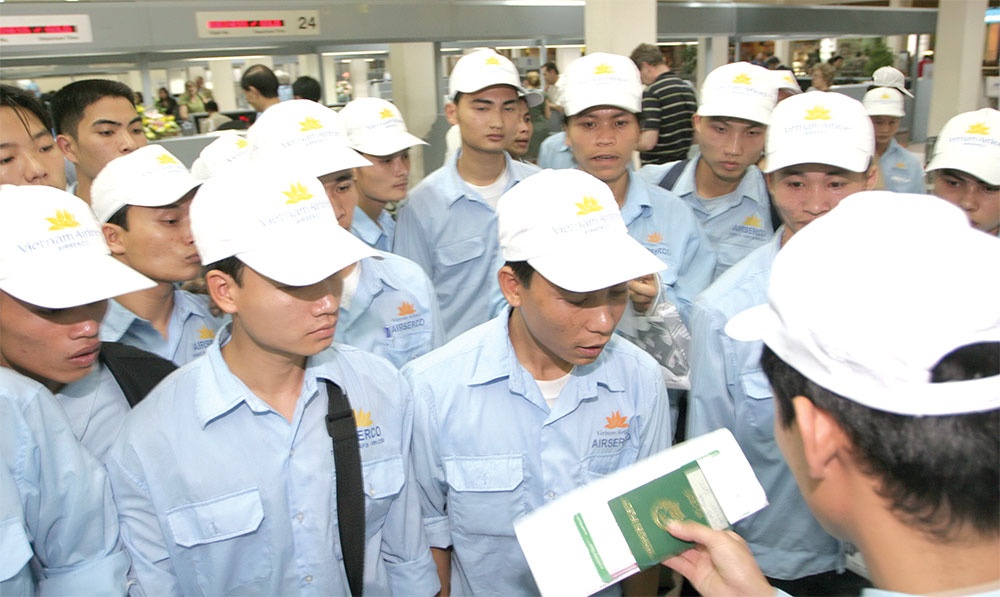High-quality training programmes crucial for overseas working success
 |
| Deputy director of the Department of Overseas Labour under the Ministry of Labour, Invalids and Social Affairs Nguyen Gia Liem |
Around 90 per cent of people sent abroad to work are unskilled. What is your view of the situation and what changes could or should be made?
Not all Vietnamese workers abroad are low-skilled, and most of them receive primary training within three months.
However, in any market or industry, language is an essential element and this is a weakness in the current training process. Employees who are fluent in the native language will have better job positions, higher incomes, and avoid the risk of conflicts with employers. Their job opportunities after returning home are also brighter with positions such as managers or assistants instead of workers that are lower in rank.
I used to meet workers who did not know anything about operating machinery, but their foreign language skills were quite good, after only a few months in Japan, they were able to operate machines fluently, and after five years they were transferred to a high-level work visa and were allowed to bring their whole family to the workplace.
On the contrary, if facing difficulties with foreign languages, workers will easily make mistakes and be penalised for them.
The ministry has taken into account the roadmap to increase the percentage of workers trained in both foreign languages and expertise. However, the vocational training policy currently only considers foreign languages as a tool for vocational training, and workers only receive a crash course for a few months before going abroad. There should be more foreign language training programmes and projects in parallel with vocational training.
In which professions and qualifications will Vietnam focus on training quality workers?
Occupation, foreign language, and training level depend on each labour market. The Japanese and South Korean markets do not require workers with a lot of professional skills but need Japanese and South Korean language skills.
With good foreign language ability, employees can perform their assigned tasks well and thereby improve their working skills. The markets of Taiwan, Europe, and the Middle East need trained workers in industries and occupations in factories, workshops, and construction sites.
In addition, some foreign labour markets are in high demand for qualified workers to work in the service sector such as restaurants, hotels, healthcare, beauty, finance, tourism, and IT but require employees to have an appropriate level of foreign language.
 |
| Vietnam sends thousands of workers abroad every year to pick up new experiences, photo Le Toan |
Along with the challenge of labour force quality, the situation of re-employment after returning home is also a worrying reality. How will this problem be solved?
There are currently no statistics or reports on the number of workers who are able to find jobs when they return home. They mainly start their own businesses or look for new jobs. Although the management agency has the policy to support job creation for workers after returning home, it has not been effective, nor has any binding sanctions at all levels.
In addition to the data system of the central agency, localities should also have a database to manage workers going abroad to work and return, including their working history abroad, occupations, and skills to put them in job centres.
Some labour export enterprises began to pay attention to this problem and orient workers before exporting. In addition to making money, workers also have to learn more so that it will be easier to find jobs after returning home. Some businesses even create job fairs and invite foreign businesses to recruit.
What targets will the upcoming export labour market focus on?
With its specialised role, we will continue to negotiate and seek high-quality and high-income markets towards developed countries such as Europe, Australia, and others.
The annual goal is to send 100,000 workers abroad. In terms of quality, the number of trained workers will gradually increase. Workers will have to be trained for at least half a year or more instead of the current 3-month primary training. The proportion of well-trained workers will gradually increase from 60 to 80 per cent by 2025, towards which all employees must be properly trained.
There is an opinion that there should be an overall strategy or programme for labour export. I think that if it is part of the overall programme on improving skills for workers and it is not necessary to develop a separate strategy.
 | Vietnam needs skilled workforce to become upper-middle-income economy by 2035: WB Vietnam will need a skilled workforce to transform itself into an upper-middle-income economy by 2035, the World Bank has suggested in its recently-released report named “Taking Stock: Educate to Grow”. |
 | Industries prepare to upskill the workforce With the international labour force shifting to younger demographics, demand for upskilling and professional empowerment is on the rise – but some employers are being slow to adapt. |
What the stars mean:
★ Poor ★ ★ Promising ★★★ Good ★★★★ Very good ★★★★★ Exceptional
Themes: Human Capital 4.0
Related Contents
Latest News
More News
- State corporations poised to drive 2026 growth (February 03, 2026 | 13:58)
- Why high-tech talent will define Vietnam’s growth (February 02, 2026 | 10:47)
- FMCG resilience amid varying storms (February 02, 2026 | 10:00)
- Customs reforms strengthen business confidence, support trade growth (February 01, 2026 | 08:20)
- Vietnam and US to launch sixth trade negotiation round (January 30, 2026 | 15:19)
- Digital publishing emerges as key growth driver in Vietnam (January 30, 2026 | 10:59)
- EVN signs key contract for Tri An hydropower expansion (January 30, 2026 | 10:57)
- Vietnam to lead trade growth in ASEAN (January 29, 2026 | 15:08)
- Carlsberg Vietnam delivers Lunar New Year support in central region (January 28, 2026 | 17:19)
- TikTok penalised $35,000 in Vietnam for consumer protection violations (January 28, 2026 | 17:15)

 Tag:
Tag:




















 Mobile Version
Mobile Version